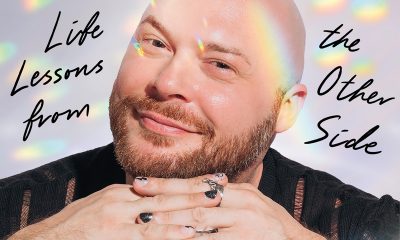Local
‘I’m not going to cry about this’
Friends rally for Va. couple saving for prosthesis after cancer claims woman’s leg
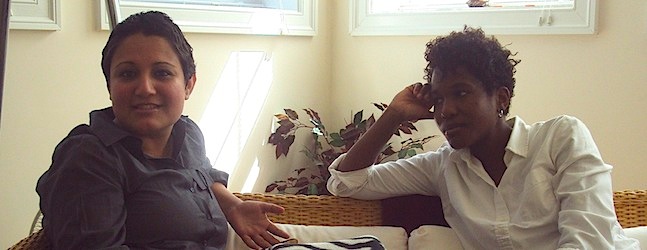

Zunaira Khalid (left) and her partner Ebony Bates in their basement apartment in Khalid's parents' house in Chantilly, Va. The couple says they're lucky most of the medical expenses from the June cancer surgery that claimed Khalid's leg were covered by insurance but only a small percentage will be covered for the prosthetic leg Khalid needs. (Washington Blade photo by Joey DiGuglielmo)
Zunaira Khalid benefit
Thursday at Policy
6:30 to 10 p.m.
Go here to make a donation.
Things were going pretty well for Zunaira Khalid and Ebony Bates in December. They’d had rough spots large and small throughout their nine-year relationship such as years of separation while Bates went to college in her native Pennsylvania, some occasional minor clashes that are inevitable in cross-cultural romances and all the usual pings and pangs that come and go as young people figure out what they want and don’t want from life.
But by the end of last year Khalid, a 35-year-old aspiring doctor and native Pakistani Muslim who’s been in the U.S. since age 12, and Bates, a 29-year-old Washington, Pa., native, realized their lives were beginning to jell. In October Bates landed what she calls her “dream job” with a government agency. She declines to say which because she says it’s not terribly gay friendly.
And after years of dabbling in various fields, Khalid, who’d drifted after finishing medical school questioning if she really wanted to be a doctor, decided medicine was her calling and she was in the uphill battle of getting back into the rigors of a residency program. Since 2005, the couple has lived in the basement of Khalid’s parents’ sprawling Chantilly, Va., home.
The two had been without health insurance for years. Bates was in school most of the ’00s doing undergrad and graduate work and Khalid had been unemployed for years studying to pass an exam to get back into medicine. The two had met in 2001 working together at Dulles Airport.
By December, Bates had coverage through her job. It took some arm twisting, but she convinced Khalid they needed to buy her some too, just in case. They found a decent plan for a little more than $100 per month through Aetna Health Insurance, an extraordinarily fortuitous decision on Bates’ part that saved the couple from financial ruin when Khalid got sick in February with an aggressive form of cancer that resulted in her leg having to be amputated in June.
“We were to the point where we’d been committed for several years,” Khalid says. “It’s almost impossible to have any sort of relationship recognition in Virginia, so that was never really discussed, but after D.C. passed marriage in December and then Ebony got a job she was like, ‘Look, we have a little money now, let’s get you a health plan. I didn’t think it was big deal. I don’t really get the flu or anything acute very often. I was like, ‘I’m fine, I don’t need it,’ but she was really adamant.”
To Khalid, she and Bates both burdened with considerable student loan debt, it seemed like one more expense. But she acquiesced and had an exam in December and got a clean bill of health.
The first signs of the cancer came innocuously in February. Khalid noticed her jeans felt tight around her left leg and took a bit of effort to get on. When it persisted, she had it looked at and was diagnosed with a pulled muscle. Just give it time to heal on its own, doctors told her. When it didn’t, she returned and an ultrasound found a cyst growing behind her knee. A biopsy revealed the mass was an aggressive sarcoma that was spreading fast. The situation quickly grew dire. It had grown from the size of a golf ball when an initial ultrasound was done to the size of a baseball a month later when an MRI was performed on Feb. 27.
Doctors told Khalid and Bates they were going to do everything they could to save her life and save her leg. It quickly became clear how potentially serious the diagnosis was.
“I remember when they said they were going to try to save her life first but we can’t guarantee that, that was really jarring for me,” Bates says. “Here they were talking about the possibility of death and if we were lucky she would make it through. It was just a lot of bad news at once.”
Bates, under pressure at her new job and in a probationary period where she knew she had to perform at her best, decided she needed to come out to her boss and explain the situation in case the stress started showing up in her performance. She was only able to miss a few days of work throughout Khalid’s illness, a point that irks the couple who marvel at the provisions that would be available if they were a married, opposite-sex couple.
But the couple opted to focus on the positive — most glaringly that Bates had the foresight to insist on an insurance plan for Khalid.
The first treatment step was two debilitating rounds of chemo, which destroyed Khalid’s immune system and put her in the hospital at Washington Hospital Center in D.C.’s Pleasant Plains neighborhood for weeks at a time. The chemo took such a toll — Khalid’s doctor told her he’d never seen anybody react so aversely to it — that a third round would have been too much for her body to handle. It was also unsuccessful at shrinking the mass to a degree doctors felt was acceptable.
There were essentially three problems with the growth — it had grown around a nerve meaning removing the mass would likely have resulted in Khalid having no control of her leg. Secondly it was so close to the bone, operating would be difficult and would have required, thirdly, a new route for blood supply to the leg, another iffy proposition considering the mass’s location. Amputation became the only safe option.
“I just realized very quickly that was the best decision I could make,” Khalid says. “I’d kind of prepared myself for it emotionally when they first told me it was a possibility. That first weekend, Eb had to be in Pennsylvania for work and I decided to go with her. It was the best thing. She was busy with work stuff but I just shopped, hung out at the hotel and really had time to make my peace with it.”
Bates soldiered on at work and says a strong relationship with Khalid’s parents — she says they treat her as if she, too, were their daughter — helped tremendously.
“Anytime I thought about how hard it was to juggle this with work, I just realized how much easier I had it compared to what she was going through,” Bates says.
Khalid is doing well now. She gets around on a pair of crutches cushioned with zebra-patterned covers. She was up and walking with a walker the day after her surgery. And she can still drive since she only needs to use her right leg.
The pain, though, has been excruciating at times. Muscle in her leg was essentially “wrapped” around hollow bone resulting in cookie-cutter like pressure from the bone’s edges. Khalid also experiences “phantom” pain where it feels as if her leg is still there, causing both pain and itching sensations.
“Basically the nerves have been cut but up here,” she says, pointing to her head, “it thinks everything is normal. So the nerves are freaking out and they don’t know what happened.”
She’s also stumbled several times as she attempts to get around.
The couple’s biggest challenge now is affording a massively expensive prosthetic leg for Khalid. The Aetna plan they chose has been great at kicking in thousands of dollars toward her chemo and surgery expenses but comes up far short on the cost of the prosthesis. The couple says it will cover only about $2,000 of the estimated $40,000 to $45,000 cost.
Friends are rallying. D.C. lesbian event promoter Ebone Bell has set up a website seeking contributions. Another lesbian friend, Darcy O’Callaghan, is planning an event Thursday at Policy for the couple. Donations are being accepted here.
Khalid says she’s keeping the stiff upper lip she’s maintained all along.
“I just decided up front I’m not going to cry about this,” she says. “I refuse to cry and give into this. If I have cried, it hasn’t been because of this stupid cancer, but because I’ve been touched by the things people have done for me.”
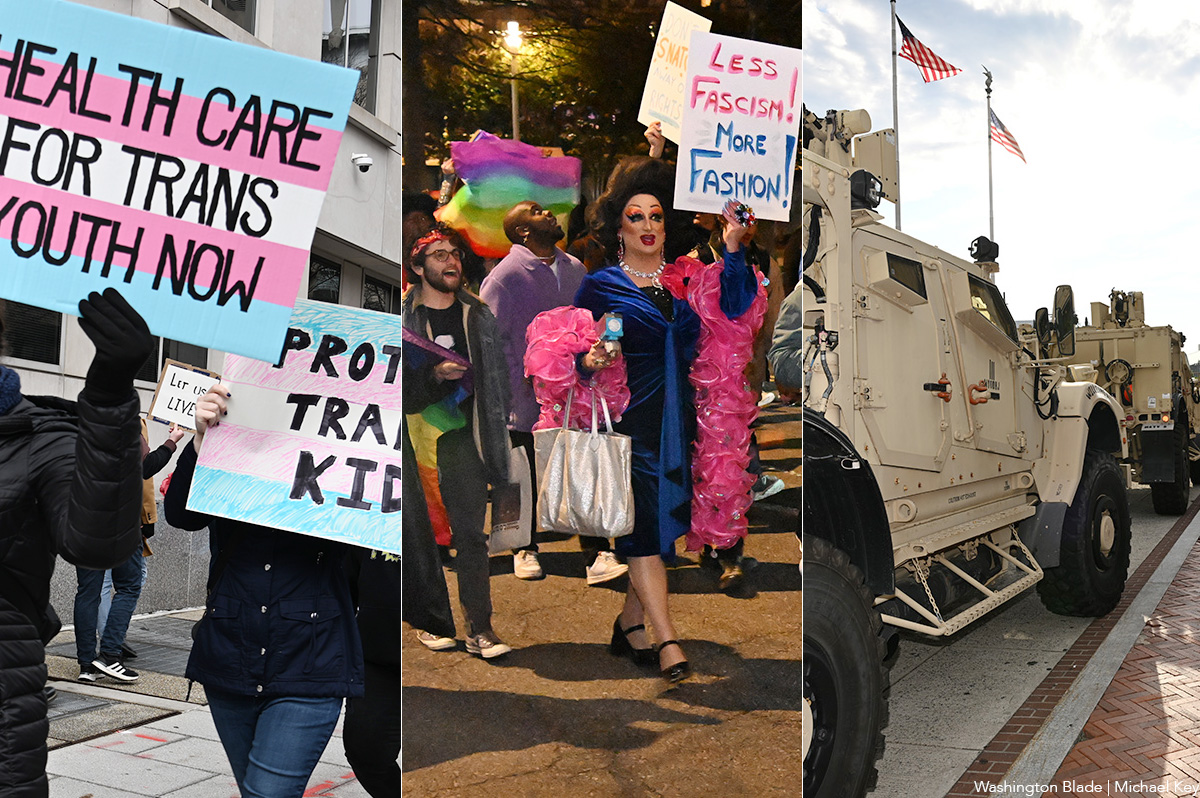
The year 2025 brought unprecedented challenges to D.C. as President Trump initiated a takeover of local police operations and implemented ICE raids in the city. Below are our picks for the top 10 LGBTQ news stories of the year.
10. Man gets 15 years for drug sale that led to deaths of two gay men
A D.C. man was sentenced by a federal judge on June 26, 2025, to 15 years in prison after he pleaded guilty three months earlier to conspiracy related charges that he distributed large amounts of fentanyl and cocaine in the D.C. area, including the sale of fentanyl that resulted in the December 2023 deaths of two D.C. gay men.
A statement released by the Office of the U.S. Attorney for D.C. said Jevaughn Mark, 33, was charged, among other things, with selling fentanyl rather than the requested ketamine, known as “Special K,” to one of the two gay victims who shared the drug with his gay friend. Police identified the men as Brandon Roman, 38, a prominent D.C. attorney and LGBTQ rights advocate, and Robbie Barletta, 28, a home renovation business owner and historic preservationist.
An official with the D.C.-based group HIPS, which provides services to drug users, called the deaths of the two men a poisoning rather than an overdose because they unknowingly consumed the highly toxic fentanyl rather than the ketamine they thought they had.
9. Drag queens, protesters denounce Trump’s Kennedy Center takeover
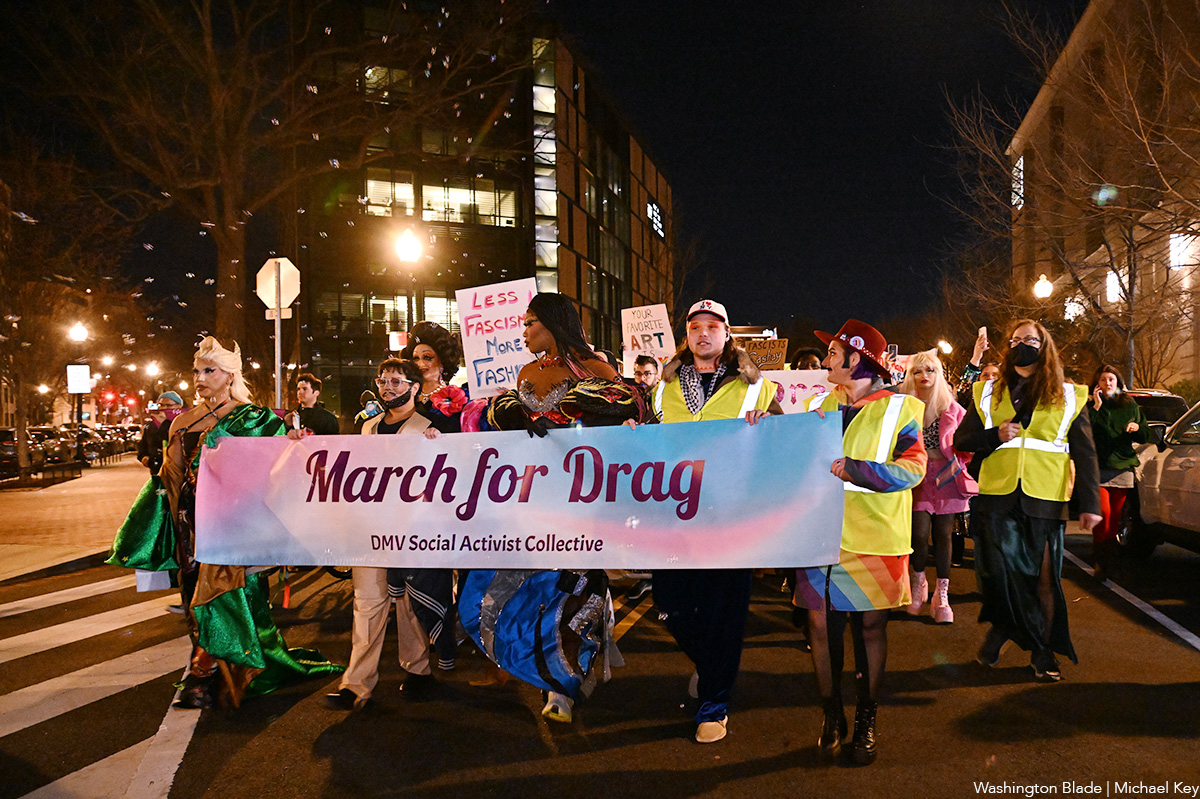
D.C. drag performer Tara Hoot was among other drag queens and about 100 supporters who marched in February from Washington Circle to the Kennedy Center to protest President Donald Trump’s Kennedy Center “takeover” by his appointment of Trump supporters to the performing arts facility’s board of directors.
Hoot and three other local drag performers followed up with their own Kennedy Center protest in June by attending the Kennedy Center’s opening night performance of “Les Misérables” while Trump himself was in attendance. Among the concerns raised by the protesters was the Kennedy Center’s decision in February to cancel a performance by the Gay Men’s Chorus of Washington scheduled for May to celebrate the upcoming WorldPride 2025 DC events. A Kennedy Center spokesperson said the performance was canceled because of “financial” and “scheduling” factors and not by the Trump initiated management changes.
8. D.C. LGBTQ Center celebrates opening of new, larger offices

The D.C. LGBTQ+ Community Center officially opened its new expanded offices on April 26 at 1828 Wiltberger St., N.W., located one block from the Shaw Metro station.
Spanning 6,671 square feet of intentionally designed space, Center Director Kimberley Bush said the new space would offer a wide range of resources for LGBTQ individuals in need – including mental health services, job readiness programs, cultural events and community support groups, all under one roof.
7. Deaths of five key local LGBTQ advocates in 2025
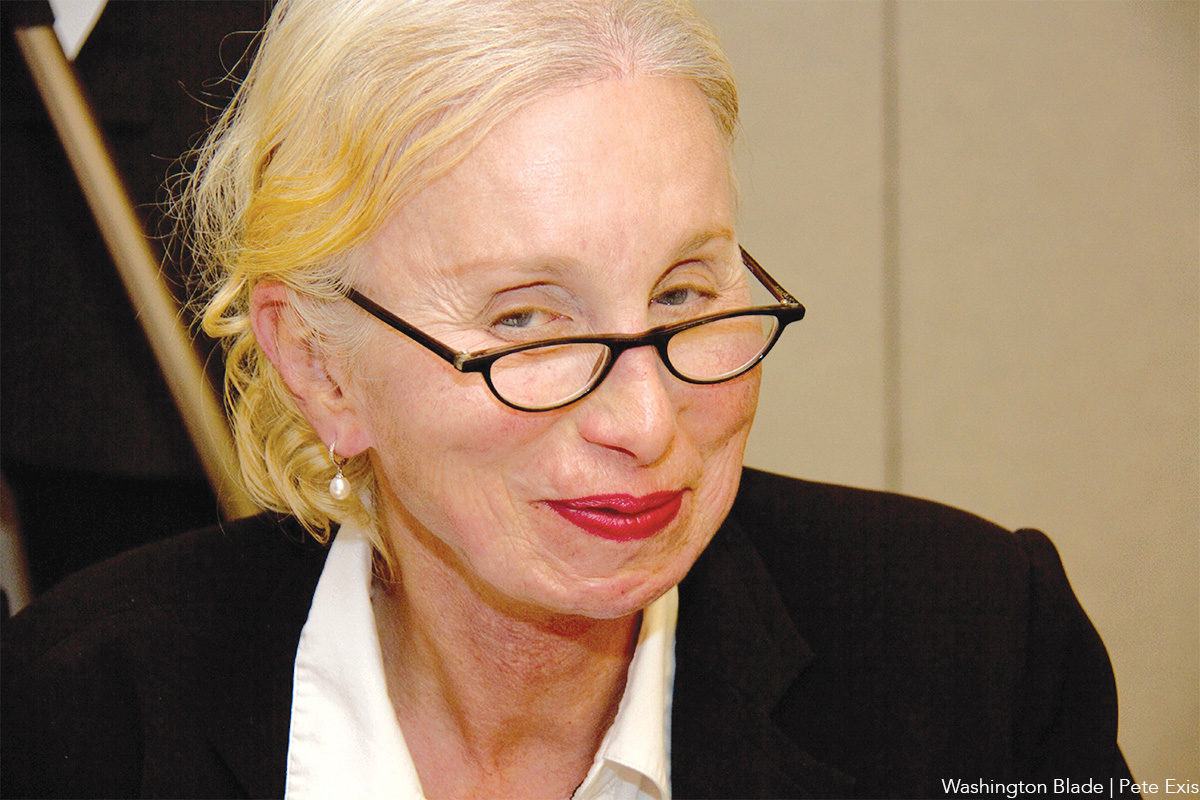
The LGBTQ community took note of the passing of at least five highly regarded local LGBTQ advocates in 2025. Among them were Jeri Hughes, 73, a longtime local transgender rights activist; Dale Sanders, 75, a highly acclaimed D.C. attorney for more than 40 years who played a leading role in providing legal services to people with HIV/AIDS; Patrick Shaw, 60, a highly regarded D.C. public schools teacher; Thomas Mangrum, 61, an acclaimed advocate for people with disabilities and LGBTQ rights activist involved in the city’s Capital Pride events; and Loraine Hutchins, a nationally known and acclaimed advocate for bisexual and LGBTQ rights, and co-author and editor of a groundbreaking book on bisexuality.
6. Pro-LGBTQ Spanberger elected Va. governor
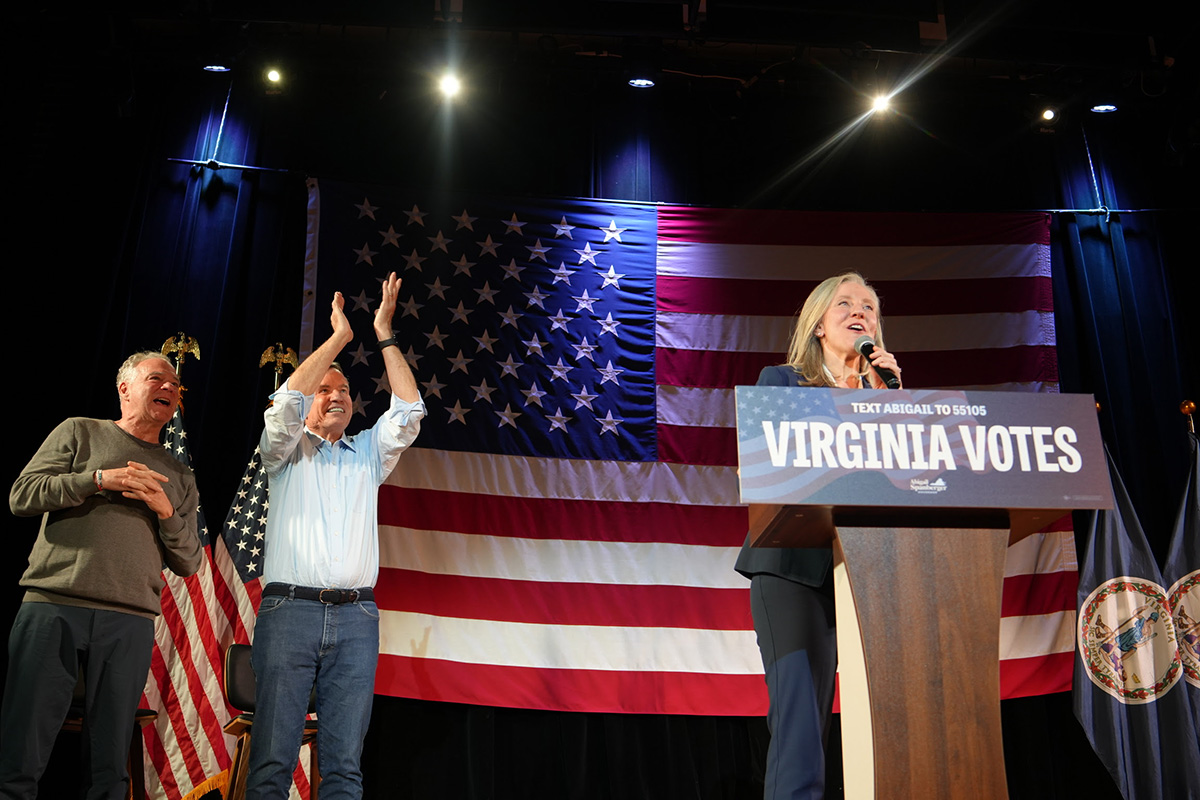
Former congresswoman and longtime LGBTQ rights supporter Abigail Spanberger (D) won her race for governor of Virginia on Nov. 6, defeating the state’s Republican lieutenant governor, Winsome Earle-Sears, who expressed strong opposition to LGBTQ equality. Spanberger, who will succeed incumbent GOP Gov. Glenn Youngkin in January, becomes Virginia’s first female governor.
Meanwhile, John Reid, a gay conservative radio talk show host in Richmond for many years, lost his race as the Republican candidate for lieutenant governor in Virginia, falling short of becoming the state’s first openly gay person to win a statewide office. Reid lost to Democrat Ghazala Hashmi, a member of the Virginia State Senate, who became the first Muslim woman to win election to a statewide office in any state.
5. Trans erasure hits D.C.
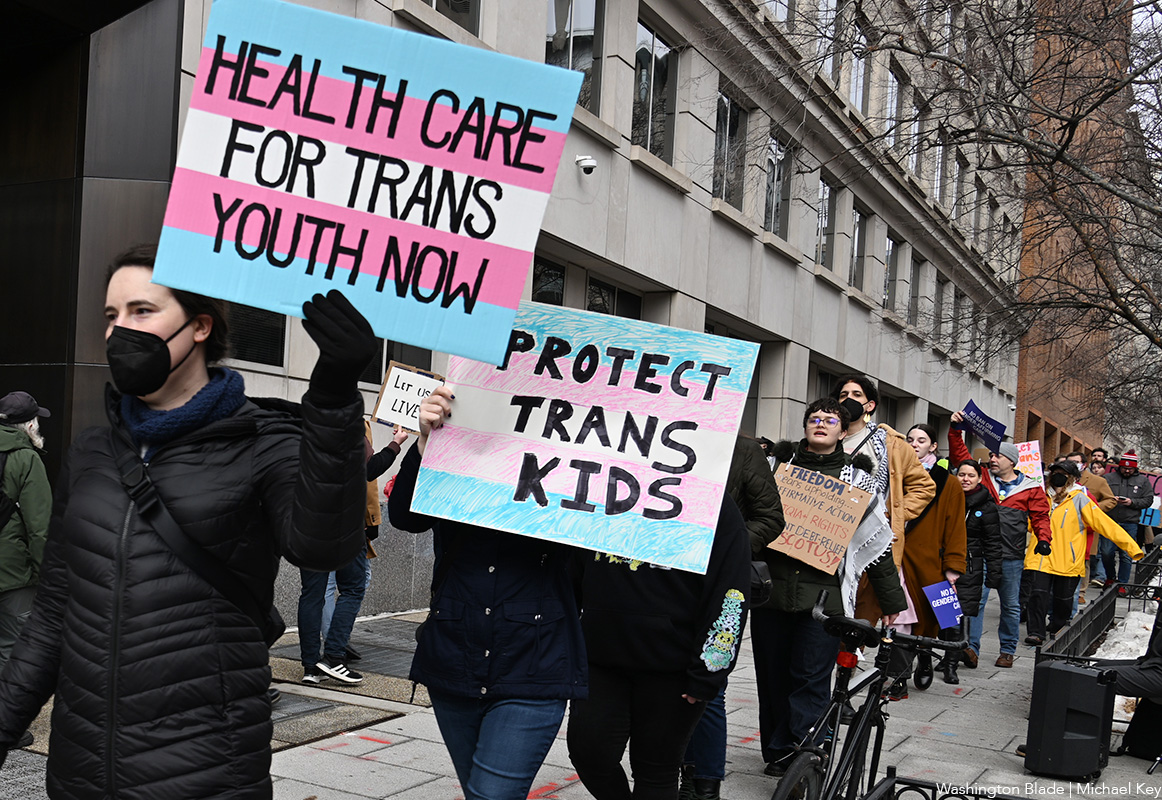
The National Park Service, which owns and maintains Dupont Circle as a federal park, in February removed all references to transgender people from its website devoted to Dupont Circle history. In a development believed to be linked to one of President Trump’s early executive orders banning federal support for trans related issues, the Park Service removed all mention of trans people from its website but left on the site multiple references to the “GLB community.”
In yet another act of what LGBTQ activists are calling “trans erasure,” D.C.’s Children’s National Hospital in July announced it would discontinue beginning Aug. 30 gender transition medical care it has provided for juvenile patients for at least the past 20 years. In a statement posted on its website, the highly acclaimed pediatric hospital said the change was made “in light of escalating legal and regulatory risks to Children’s National.” Most observers interpreted that to mean the risk of federal funding cuts linked to the Trump administration’s animus toward trans supportive programs or policies.
4. D.C. Mayor Bowser announces she will not run for re-election

D.C. Mayor Muriel Bowser, a longtime vocal supporter of the LGBTQ community, announced on Nov. 25 that she will not run for a fourth term. Since first taking office as mayor in January 2015, Bowser has been an outspoken supporter on a wide range of LGBTQ-related issues, including marriage equality and services for LGBTQ youth and seniors.
LGBTQ activists have pointed out that Bowser’s record of support on LGBTQ issues dates back to her tenure as the Ward 4 D.C. Council member from 2007 through January 2015, when she took office as mayor. They also credit her with expanding and significantly increasing funding for the Mayor’s Office of LGBTQ Affairs and appointing the largest number of openly LGBTQ officials to D.C. government jobs than any prior D.C. mayor.
“It has been the honor of my life to be your mayor,” Bowser said in a statement.
3. D.C. LGBTQ bars ‘hanging in there’ amid tough economy

The owners of several of D.C.’s at least 25 LGBTQ bars told the Blade in November they had been negatively impacted by a series of developments and issues impacting most other D.C. bars, restaurants, and nightlife venues. Among the lead issues impacting them, they said, were the deployment by President Trump of National Guard troops on city streets, the nearly two-month-long federal government shutdown that ended in late November, and skyrocketing prices of food and other supplies brought about by the Trump administration’s tariff program.
Other factors cited were a decline in tourist visits to D.C. due to alienation from the Trump administration and a large increase in the number of LGBTQ bars in recent years that some observers said has resulted in fewer people going to each of the LGBTQ bars, the latest one, Rush at 14th and U Street, N.W., having opened in December.
2. At least 1.2 million turn out for WorldPride D.C.

At least 1.2 million people turned out from throughout the U.S. and internationally for WorldPride D.C. 2025, which took place from mid-May through June. It included hundreds of events held across the city. Among them were an international human rights conference, a March on Washington for LGBTQ Equality, sporting events with LGBTQ athletes, concerts by LGBTQ choral groups and nationally acclaimed pop musicians.
The events culminated with a six-hour-long WorldPride Parade on June 7 that drew hundreds of thousands of participants and bystanders and included a 1,000-foot long rainbow flag that led the parade. The WorldPride street festival and concert took place that same day and the following day, on June 8, along Pennsylvania Ave, N.W. that included hundreds of booths.
The 1.2 million attendance and the a $310 million economic impact it had on the city were significantly less that what had been initially predicted by city officials, who, along with LGBTQ activists, said the lower attendance and economic impact was due in part to the anti-LGBTQ policies and alienation of many potential foreign visitors by the Trump administration.
1. Trump takes control of D.C. police, deploys National Guard

LGBTQ rights advocates joined community leaders across the city in condemning President Donald Trump’s decision in August to take control of the D.C Metropolitan Police Department and deploy 800 National Guard troops to address what he called a crime wave caused by “bloodthirsty criminals” and “roving mobs of wild youth.”
A coalition of local LGBTQ advocacy organizations joined other community leaders, including gay D.C. Council member Zachary Parker (D-Ward 5), in calling Trump’s action a “power grab” aimed at eliminating D.C.’s locally elected government that would adversely impact people of color, the LGBTQ and immigrant communities.
In a development that captured national attention, a gay man was arrested on Aug. 10 on a misdemeanor assault charge for tossing a hero sandwich into the chest of a uniformed U.S. Customs and Border Control agent on a street near several gay bars in what he called an act of protest and defiance of the Trump deployment of federal troops and agents in D.C. In what some observers called a gesture of support for gay sandwich thrower Sean Charles Dunn, a federal court jury handed down a verdict of not guilty for the assault charge.
District of Columbia
Reasons to be optimistic about 2026
Local thought leaders offer hope for the New Year
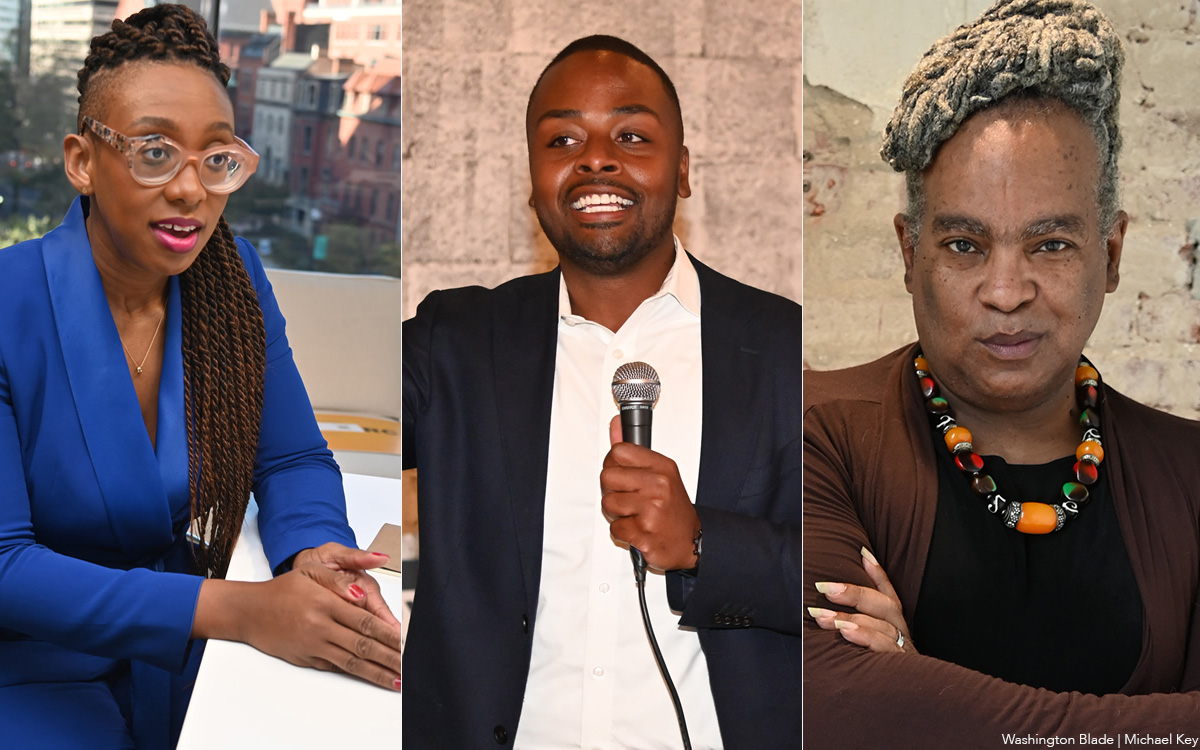
It was a year like no other. It began with Donald Trump’s inauguration in January 2025 and included a takeover of D.C. police, ICE raids, challenges for the local economy, and other events that have many queer Washingtonians ready for 2026.
As we prepare to welcome the New Year, the Blade asked a range of local thought leaders about what makes them optimistic for 2026. Here are their responses.
June Crenshaw
Deputy Director, Capital Pride Alliance
What gives me optimism for 2026 is the way our LGBTQIA2S+ community supports one another – across identities, neighborhoods, and movements – and because we continue to build our collective powers; we demand and create safer, more inclusive spaces.
Zachary Parker
Ward 5 DC. Council member
I’m optimistic about the upcoming elections and the District’s continued fight for local autonomy. One thing I know for sure is that Washingtonians are tough and persistent, and we’re ready to face any challenge as we keep fighting for D.C. statehood.
Sister Jeannine Gramick
Co-founder of LGBTQ supportive New Ways Ministry
As a nun who thinks politically about the Catholic Church, I’m extremely optimistic that Pope Leo XIV will continue to welcome LGBTQ people. At the conclave, most cardinals knew Pope Francis had (then) Cardinal Proost in mind!
Adam Ebbin
Virginia State Senator representing parts of Arlington, Alexandria, and Fairfax Counties
I am excited about 2026 bringing the return of the pro-equality governor to Virginia. I believe that Abigail Spanberger will be a champion for LGBT people and it will also be the year that we can finally pass the necessary legislation to send a constitutional amendment to the voters that would guarantee marriage equality in the Virginia Constitution.
Howard Garrett
President, Capital Stonewall Democrats
In 2026, our community can be optimistic because we’ve proven, again and again, that when we organize, we win: at the ballot box, in the courts, and in our neighborhoods. Even amid challenge, LGBTQ+ Washingtonians and our allies are building stronger coalitions, electing champions, and advancing real protections that make daily life safer and more affirming for everyone.
Paul Kuntzler
D.C. LGBTQ activist since the early 1960s, co-founder of Capital Stonewall Democrats
Last Nov. 4, 11 states held elections and Democrats won almost all of the elections. Next Nov. 3, 2026, Democrats will win control of both the House and Senate …An Economist poll reported that 15 percent to 20 percent of those who voted for Trump no longer support him. The results of the elections of Nov. 3, 2026, will be the beginning of the end of Trump and his racist and criminal regime.
Kelley Robinson
President, Human Rights Campaign
This past year has brought relentless attacks against the LGBTQ+ community, but it has also shown the resiliency of queer folks. While this administration has worked tirelessly to oppress us, we’ve met that oppression with courage. As we step into 2026, my hope is that we carry that energy forward and continue protecting one another, fighting back against injustice, and celebrating queer joy. If 2026 is anything like 2025, we know the challenges will be intense, but our community is more determined than ever to meet hate with resilience, and to turn struggle into strength.
Freddie Lutz
Owner, Freddie’s Beach Bar in Arlington and Rehoboth Beach
I am optimistic that the current president will fulfill his promise to boost the economy. We are all suffering – businesses in D.C. I just read it is 17 to 18 percent down. And I’m hoping the president will boost the economy. I always try to remain optimistic.
Nicholas F. Benton
Owner & Editor, Falls Church News-Press
My optimism stems from my belief in the human capacity and generosity of spirit. Those who are committed to those qualities will find a way.
Richard Rosendall
Former president, D.C. Gay & Lesbian Activists Alliance
MAGA efforts to demonize LGBTQ people are dangerous but will fail overall because understanding and acceptance have grown and endured. The blue wave in November 2026 will show this.
TJ Flavell
Organizer, Go Gay DC
Hope springs eternal. Nurturing your own wellness is vital to the New Year, including enjoying social and cultural activities through such groups as Go Gay DC – Metro DC’s LGBTQ Community. Also, 2026 ushers in a new tax deduction for charitable giving. Check the IRS website for details. You can make a positive impact in the New Year by supporting good charitable causes like the D.C. LGBTQ+ Community Center, a safe, inclusive, and affirming space where all members of our community can thrive.
Rayceen Pendarvis
Leader of Team Rayceen D.C. LGBTQ support organization
I have experienced many trials and tribulations in my lifetime, throughout which my spirit has enabled me to find peace despite the turbulence around me. Being optimistic allows me to be a beacon of light for those who may be lost in the darkness.
Zar
Team Rayceen organizer
My reason for optimism is this: death. Life is a cycle of time, change, and destruction. Everything is impermanent; the time any person rules is finite and eventually all empires end.
DJ Honey
Team Rayceen supporter
Despite the noise, I see 2026 as a year where queer people continue choosing community over isolation. Even when challenged, our culture keeps evolving. We are more visible, more creative and intentional about building spaces that protect each other and center joy without asking permission.
Nick Tsusaki
Owner, Spark Social House, D.C. LGBTQ café and bar
I’m optimistic for 2026 because it feels like the tide is turning and we’re coming together as a community.
District of Columbia
Rush reopens after renewing suspended liquor license
Principal owner says he’s working to resolve payroll issue for unpaid staff
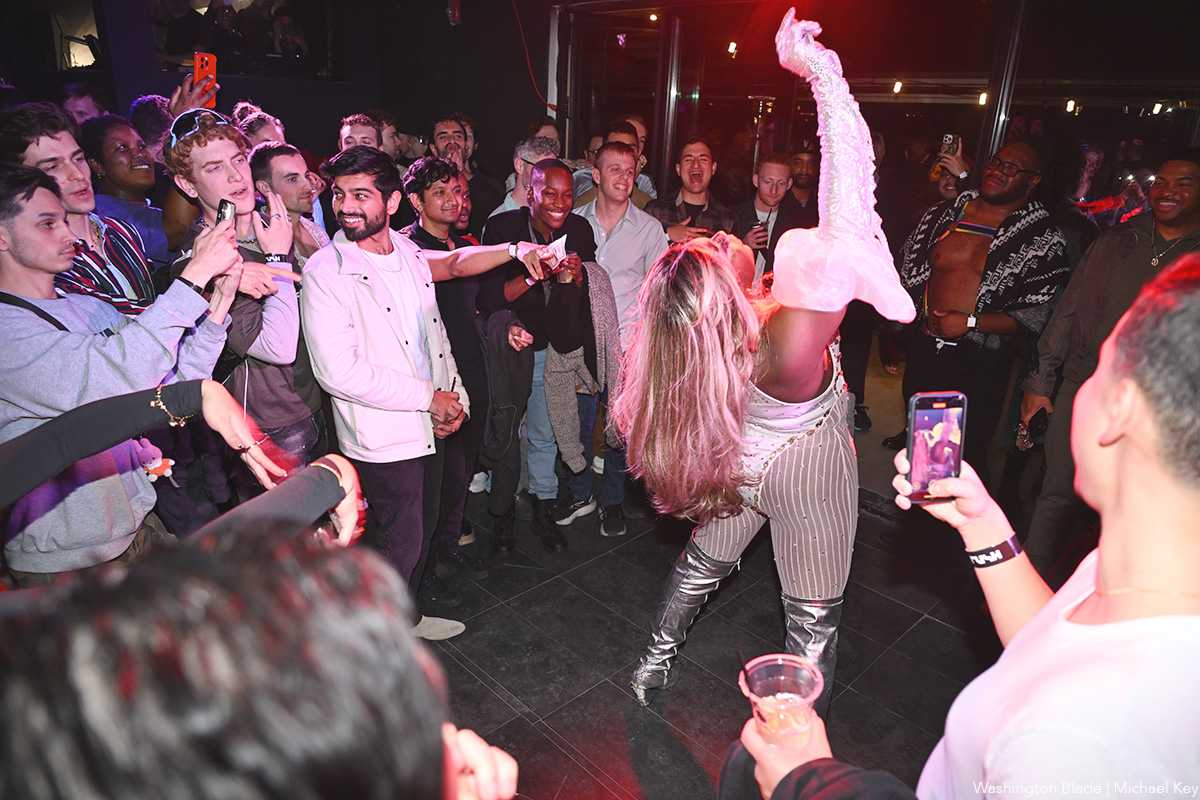
The D.C. LGBTQ bar and nightclub Rush reopened and was serving drinks to customers on Saturday night, Dec. 20, under a renewed liquor license three days after the city’s Alcoholic Beverage and Cannabis Board suspended the license on grounds that Rush failed to pay a required annual licensing fee.
In its Dec. 17 order suspending the Rush liquor license the ABC Board stated the “payment check was returned unpaid and alternative payment was not submitted.”
Jackson Mosley, Rush’s principal owner, says in a statement posted on the Rush website that the check did not “bounce,” as rumors circulating in the community have claimed. He said a decision was made to put a “hold” on the check so that Rush could change its initial decision to submit a payment for the license for three years and instead to pay a lower price for a one-year payment.
“Various fees and fines were added to the amount, making it necessary to replace the stop-payment check in person – a deadline that was Wednesday despite my attempts to delay it due to these circumstances,” Mosley states in his message.
He told the Washington Blade in an interview inside Rush on Saturday night, Dec. 20, that the Alcoholic Beverage and Cannabis Administration (ABCA) quickly processed Rush’s liquor license renewal following his visit to submit a new check.
He also reiterated in the interview some of the details he explained in his Rush website statement regarding a payroll problem that resulted in his employees not being paid for their first month’s work at Rush, which was scheduled to take place Dec. 15 through a direct deposit into the employees’ bank accounts.
Several employees set up a GoFundMe appeal in which they stated they “showed up, worked hard, and were left unpaid after contributing their time, labor, and professional skills to Rush, D.C.’s newest LGBTQ bar.”
In his website statement Mosley says employees were not paid because of a “tax related mismatch between federal and District records,” which, among other things, involves the IRS. He said the IRS was using his former company legal name Green Zebra LLC while D.C. officials are using his current company legal name Rainbow Zebra LLC.
“This discrepancy triggered a compliance hold within our payroll system,” he says in his statement. “The moment I became aware of the issue, I immediately engaged our payroll provider and began working to resolve it,” he wrote.
He added that while he is the founder and CEO of Rush’s parent and management company called Momentux, company investors play a role in making various decisions, and that the investors rather than he control a “syndicated treasury account” that funds and operates the payroll system.
He told the Blade that he and others involved with the company were working hard to resolve the payroll problem as soon as possible.
“Every employee – past or present – will receive the pay they are owed in accordance with D.C. and federal law,” he says in his statement. “That remains my priority.”
In a follow-up text message to the Blade on Sunday night, Dec. 21, Mosley said, “All performers, DJs, etc. have been fully paid.”
He said Rush had 21 employees but “2 were let go for gross misconduct, 2 were let go for misconduct, 1 for moral turpitude, 2 for performance concerns.” He added that all of the remaining 14 employees have returned to work at the time of the reopening on Dec. 20.
Rush held its grand opening on Dec. 5 on the second and third floors of a building at 2001 14th Street, N.W., with its entrance around the corner on U Street next to the existing LGBTQ dance club Bunker.
With at least a half dozen or more LGBTQ bars located within walking distance of Rush in the U Street entertainment corridor, Mosley told the Blade he believes some of the competing LGBTQ bars, which he says believe Rush will take away their customers, may be responsible along with former employees of “rumors” disparaging him and Rush.











